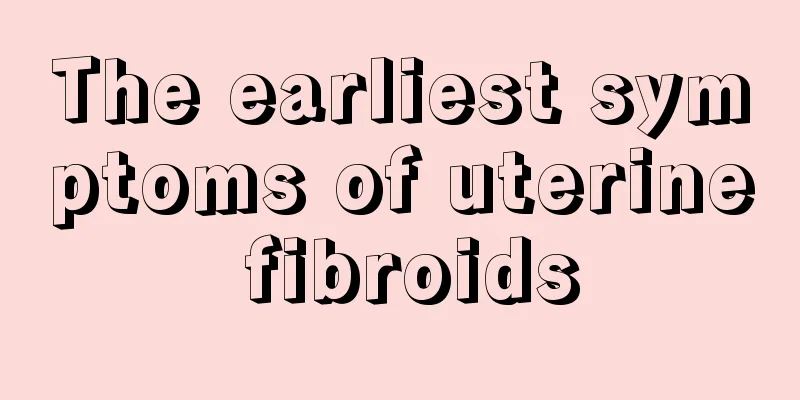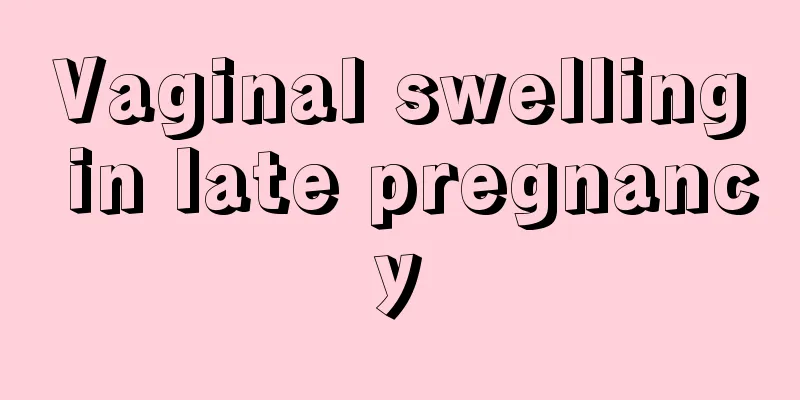The earliest symptoms of uterine fibroids

|
The symptoms of uterine fibroids include irregular menstruation, lumps in the lower abdomen, excessive leucorrhea, compression symptoms, back pain, etc. If this symptom is found, it should be taken seriously to prevent the condition from worsening and affecting the treatment effect. Symptoms of uterine fibroids include the following: Symptoms of uterine fibroids 1. Irregular menstruation Irregular menstruation with increased menstrual volume and prolonged menstrual duration is the most common symptom of uterine fibroids. It is common in large intramural fibroids and submucosal uterine fibroids. Uterine fibroids expand the uterine cavity, increase the area of the uterine wall and affect uterine contractions. In addition, uterine fibroids may squeeze the veins around the tumor, causing hematoma and dilatation of the uterine wall venous plexus, which in turn causes increased menstrual volume and prolonged menstruation. When submucosal uterine fibroids are accompanied by necrosis and infection, there may be irregular vaginal bleeding or bloody pus discharge. Long-term increase in menstrual volume may lead to secondary anemia, fatigue, palpitations and other symptoms. 2. Lower abdominal mass Uterine fibroids are not felt as lumps in the abdomen at first, but can be felt from the abdomen when the uterine fibroids gradually expand and the uterus exceeds 3 months of pregnancy. Very large submucosal uterine fibroids can slip in and out of the vagina, and patients may seek medical treatment due to slipped lumps in the private parts. 3. Excessive leucorrhea Intramural fibroids expand the total area of the uterine cavity, increase the metabolism of the endometrial glandular ducts, and are accompanied by pelvic congestion leading to excessive leucorrhea; once submucosal uterine fibroids are infected, there may be a lot of thick secretions. If there is ulceration, necrosis, or bleeding, there may be bloody or thick bloody vaginal discharge with a foul odor. 4. Oppressed Diseases Uterine fibroids in the lower segment of the anterior wall of the uterus can compress the bladder and cause frequent urination, urgency, and inability to hold urine; cervical fibroids can cause difficulty in urination and urine retention; uterine fibroids on the posterior wall of the uterus (muscular wall or posterior wall) can cause lower abdominal pain and discomfort, constipation and other symptoms. Broad ligament fibroids or oversized cervical fibroids tend to develop laterally, and the compressed urethra tube placed in the pelvis blocks the upper urinary tract, causing ureteral dilatation and even hydronephrosis. 5. Other symptoms Including lower abdominal pain, back pain, and aggravated menstrual symptoms. When uterine fibroids turn bright red, there is subacute lower abdominal pain, accompanied by vomiting, fever and tenderness in the tumor area; torsion of the pedicle of subserosal fibroids may cause acute abdominal pain; abdominal pain may also be caused when submucosal uterine fibroids are expelled from the uterine cavity to the outside. Submucosal and intramural fibroids that cause deformation in the uterine cavity can cause infertility or miscarriage. |
<<: The reason why women have recurrent acne on their chins
Recommend
I got cold one week after ovulation and I'm pregnant.
Some friends had sex during their ovulation perio...
Will postpartum urinary incontinence heal on its own?
When a pregnant woman gives birth, the human body...
What is the simplest breast enhancement exercise?
Some girls are very dissatisfied with their small...
What does aging really mean for the elderly body?
Author: Wang Changhong, Chief Physician and Profe...
How to treat female trichomoniasis infection
Female trichomoniasis is caused by trichomoniasis...
Consequences of ovarian removal in women
The closest companions in the journey of life are...
Why do women get yeast?
Candidal vaginitis is a common gynecological dise...
What does bilateral adnexal cyst mean?
Bilateral adnexal cysts are very common in daily ...
Does stomach acid in late pregnancy mean that you are about to give birth?
In the late pregnancy, some pregnant women will e...
What are the symptoms of kidney yin deficiency in girls?
Many people are very afraid of kidney deficiency,...
Is there an acquired cause for uterine septate?
Uterine septum is caused by congenital abnormalit...
Marathon may leave some people "very injured"
Huawei lost a great general. It is reported that ...
Is it better to use a deep pot or a shallow pot for yew? When is the best time to plant yew cuttings?
Yew is a highly ornamental plant. Because of its ...
What should pregnant women do if their mouths get ulcerated?
If you find bubbles in your mouth or sores at the...
Vitamin A supplementation after abortion is beneficial to the recovery of endometrium
Abortion is no stranger to us. It was a taboo top...









